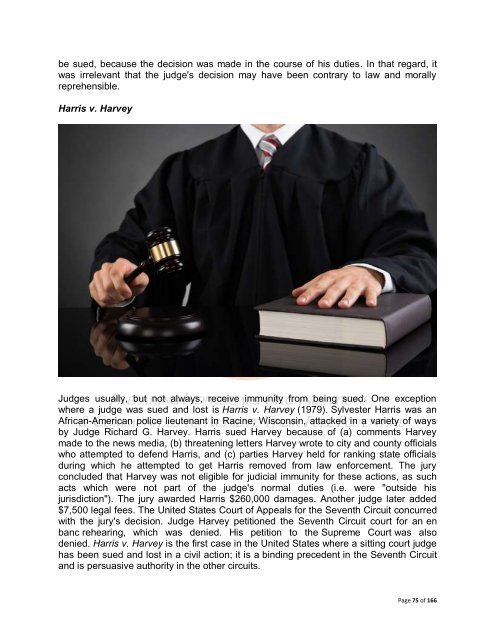You also want an ePaper? Increase the reach of your titles
YUMPU automatically turns print PDFs into web optimized ePapers that Google loves.
e sued, because the decision was made in the course of his duties. In that regard, it<br />
was irrelevant that the judge's decision may have been contrary to law and morally<br />
reprehensible.<br />
Harris v. Harvey<br />
Judges usually, but not always, receive immunity from being sued. One exception<br />
where a judge was sued and lost is Harris v. Harvey (1979). Sylvester Harris was an<br />
African-American police lieutenant in Racine, Wisconsin, attacked in a variety of ways<br />
by Judge Richard G. Harvey. Harris sued Harvey because of (a) comments Harvey<br />
made to the news media, (b) threatening letters Harvey wrote to city and county officials<br />
who attempted to defend Harris, and (c) parties Harvey held for ranking state officials<br />
during which he attempted to get Harris removed from law enforcement. The jury<br />
concluded that Harvey was not eligible for judicial immunity for these actions, as such<br />
acts which were not part of the judge's normal duties (i.e. were "outside his<br />
jurisdiction"). The jury awarded Harris $260,000 damages. Another judge later added<br />
$7,500 legal fees. The United States Court of Appeals for the Seventh Circuit concurred<br />
with the jury's decision. Judge Harvey petitioned the Seventh Circuit court for an en<br />
banc rehearing, which was denied. His petition to the Supreme Court was also<br />
denied. Harris v. Harvey is the first case in the United States where a sitting court judge<br />
has been sued and lost in a civil action; it is a binding precedent in the Seventh Circuit<br />
and is persuasive authority in the other circuits.<br />
Page 75 of 166

















